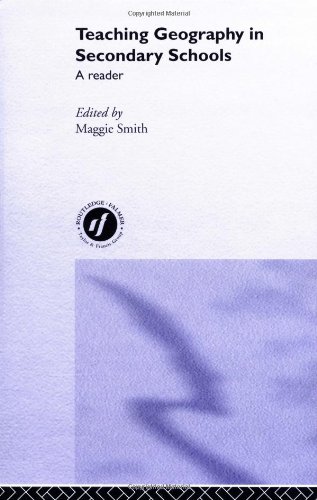

Most ebook files are in PDF format, so you can easily read them using various software such as Foxit Reader or directly on the Google Chrome browser.
Some ebook files are released by publishers in other formats such as .awz, .mobi, .epub, .fb2, etc. You may need to install specific software to read these formats on mobile/PC, such as Calibre.
Please read the tutorial at this link. https://ebooknice.com/page/post?id=faq
We offer FREE conversion to the popular formats you request; however, this may take some time. Therefore, right after payment, please email us, and we will try to provide the service as quickly as possible.
For some exceptional file formats or broken links (if any), please refrain from opening any disputes. Instead, email us first, and we will try to assist within a maximum of 6 hours.
EbookNice Team

Status:
Available5.0
32 reviews
ISBN 10: 020399423X
ISBN 13: 9780203994238
Author: Margaret Smith
A companion to Aspects of Teaching Secondary Geography, Teaching Geography in the Secondary School: A Reader brings together a wide range of key writings that look at central issues, debates and ideas surrounding geography education today. It encourages students to reflect critically upon the issues in order to develop their understanding of these issues and to consider the implications for their classroom practice.
Section 1: Geography In the School Curriculum
1. Geography: Changes and Challenges
Curriculum Development
Research Matters
Subject Associations
Teacher Education
International Developments
Challenges for the Subject
References
2. School Geography In England 1991–2001: The Politics and Practicalities of Curriculum Change
Why 1991?
The Policy Cycle Applied to the Changing Geography Curriculum
Identifying Some Key Conclusions and Issues
Conclusion
References
3. Constructing School Geographies
Introduction
Origins
The 1960s
Explaining the ‘Paradigm Shift’ In School Geography
The 1980s and the ‘Return of Tradition’
The National Curriculum
The ‘Naturalisation’ of School Geography
Some Conclusions
References
Section 2: Geography In (And Out of) The Classroom
4. The Enquiry-Based Approach to Teaching and Learning Geography
A Clear Enquiry Focus
A Meaningful Sequence of Enquiry
Opportunities for Skill Development
Open and Closed Enquiries
Partners In Enquiry
References
5. Curriculum Planning and Course Development: A Matter of Professional Judgement
Introduction
From Syllabus to Curriculum
General Considerations
Initial Drafting
The Objectives Model of Planning
A Process Model of Curriculum Development
Professional Dilemmas In Curriculum Planning
References
6. Continuity and Progression
The Scope for Continuity
The Scope for Progression
Planning for Progression
Breadth of Geographical Knowledge
Depth of Geographical Understanding
Use of Geographical Skills
Attitudes and Values
Building Progression Into a Scheme of Work
References
7. Teaching Styles and Strategies
Contexts and Concerns
Methods of Teaching Geography
Techniques of Teaching Geography
Frameworks for Describing and Analysing Teaching Styles
Understanding Different Teaching Strategies
Developing Pedagogic Knowledge In Geography Education
References
8. Differentiation In Teaching and Learning Geography
Achieving Differentiation
References
9. Using Assessment to Support Learning
Introduction: Assessment In Education
Identifying Formative Assessment
Assessment for Learning
Research Evidence
Conclusion: Priorities for Geography Education?
Note
References
10. Raising Attainment In Geography: Prospects and Problems
The Piaget Stumbling Block
The Limits of Concrete Thinking
Implications for National Curriculum Geography
The Evidence from Science and Mathematics
Implications for Teaching Style
Does Cognitive Acceleration Work?
The Prospects for Cognitive Acceleration In Geography
Notes
References
11. Issues In ICT and Geography
Introduction
Why ICT?
The Changing Climate for ICT
The Range of ICT
The Challenge for Geography
The Challenge for Developers and Providers
The Challenge for Teachers and Schools
The Challenge for Us All
References
Web Sites
12. Fieldwork In the School Geography Curriculum: Pedagogical Issues and Development
The Development of Fieldwork In School Geography
The Aims of School Fieldwork
Teaching and Learning Strategies
Developing Pedagogical Themes In Fieldwork
Teaching Through Fieldwork – A Perspective On the Future
References
13. Inclusion In Geography
What Is Meant By Inclusion?
Inclusion In the National Curriculums
Inclusion As Defined By Ofsted
The Index of Inclusion
What Actions Can Be Taken to Increase Inclusion Within Geography?
What Specific Areas of the Geography Curriculum Might Be Considered In Relation to Inclusion?
Conclusion
References
Further Resources
14. Language and Learning In Geography
Introduction
Talk Within the Geography Classroom
Group Work and Language
Writing
Audience
Genres
Reading
DARTS
Geographical Terminology
Conclusions
References
Section 3: Geography for the Twenty-First Century
15. The Geo Visions project
Introduction
The Focus for Debate
Potential for Change
Geo Visions – Aims
A Shared Vision
Acknowledgement
Reference
16. Environmental Change and Sustainable Development
What Is ‘Environmental Change and Sustainable Development’?
How Does ‘Environmental Change and Sustainable Development’ Measure Up?
Making ‘Environmental Change and Sustainable Development’ Happen
References
17. Citizenship and Geographical Education
Geography!
This Chapter
Citizenship
Liberal for Whom?
‘Deep’ Citizenship
To What Extent Can Geography Take Responsibility for Citizenship Education?
Where Next?
References
18. Towards a Critical School Geography
Developing an Historical Perspective
Current Educational Reform and the National Curriculum
Critical Theory
Priorities for a Critical School Geography
A Return to Professionalism
References
19. Geography Matters In a Globalized World
An Example
Globalization
Some Issues
In the Academy
Notes
References
20. Is Geography History?
Decoding the Evidence
Assessing the Implications
Conclusion
Notes
Section 4: Research, Geography and Continuing Professional Development
21. The Role of Research In Supporting Teaching and Learning
Introduction
A Model of the Teaching and Learning Situation
Mapping Geography Education Research Onto the Model
Conclusions
References
22. Understanding How Geographical Educators Learn In Their Work: An Important Basis for Their Professional Development
Adult Learning from the Basis of Experience
How Do Adults Learn In Their Work?
How Do Geographical Educators Learn In Their Professional Work?
Conclusion
References
23. Action Research for a New Professionalism In Geography Education
What Is the Use of Research?
What Is Educational Action Research?
Characteristics of Action Research
The Origins and Development of Action Research
How Is Action Research Undertaken?
A New Professionalism
teaching geography in elementary school
geography book 3
geography in teaching
geography education in the united states
teaching geography in secondary schools pdf
Tags: Margaret Smith, Geography, Secondary